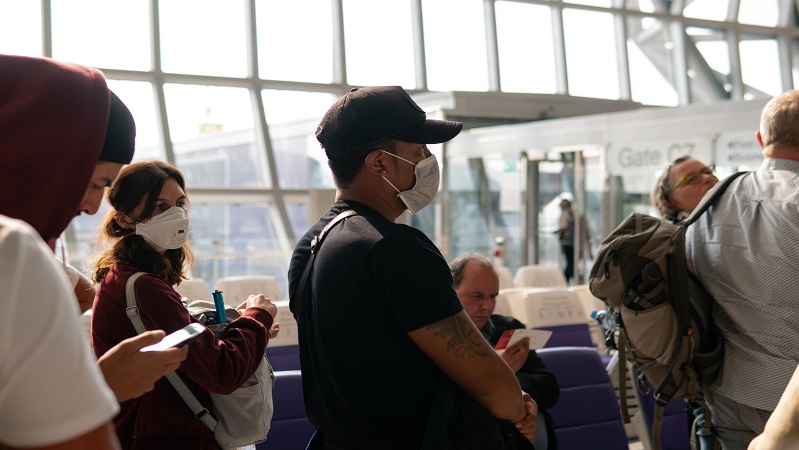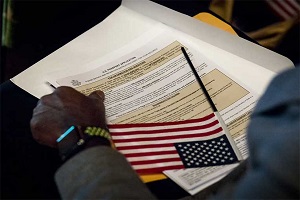Can I Travel In Or Out Of The United States As An Immigrant?
Spanish Video Above Translated To English Below
An immigration process can take a long time even if it is well done, it can take up to 9 months just to obtain a Work Permit.
If you are looking forward to visiting family or meeting people outside the United States this Christmas, for example, now is the time to start your immigration process.
Probably, in a case that comes with a Travel Permit if you are part of such a case it’s going to take between 6 and 9 months just to receive the permit after submitting your application with immigration.
That’s why it is worth starting this process now because we always have people calling us in October and November, when it’s already time to buy their flight tickets, and they ask us if they can travel outside the United States.
It’s difficult for us to have to say no, that there’s no way to obtain a permit for your planned trip before your travel date.
So, although it may seem early to you, now is the time as an immigrant to plan your year-end vacation.
Family Petitions With The Help Of An Attorney & The Re-Entry Permit
In practically any type of immigration-related case, it’s worth hiring an attorney, and the reason is that when we are talking about a person who intends to adjust their immigration status, there may be many complications in this type of sensitive case.
For those people, it is worth finding out that they have enough time for their plans, because if there is a rejection of their package, a delay due to a lack of evidence, or if immigration denies the case because the strategy is not well done.
This can extend the process, and especially for a couple that has plans to move out of the United States, what we need to do is to obtain their permanent residency.
Normally, a residency usually takes 1 year, and if the person is going to leave the U.S. for more than a year, a re-entry permit will be needed to protect your residency.
The rule with this type of case is that the case must be sent before the person leaves and biometric fingerprinting must be done before departure.
It’s not a petition that a permanent resident can apply for outside of the United States, that’s another detail we always mention in calls from people with Green Cards or permanent residence.
Those people say, for example, that they are going to study abroad, that they are going to go with their spouse because they have a job abroad and they are leaving in 2 weeks, that does not give us enough time to prepare and protect that person’s residence before their departure.
That’s why it is very important to consult with us, we also have to check if she qualifies for an adjustment of status, that we can do it in that time and we can apply for the re-entry permit in time.
When Is The Best Time To Start My Case For Travel Outside The U.S.?
As soon as possible, because for example for people living in Austin, your adjustment of the status case if you qualify is going to take 1 year, and it is going to be 9 months to get the Travel Permit.
In the case of a person who is under the DACA program, we must investigate how many entries and exits they have in the United States, how they entered, and this person may need to request an Advance Parole, which is a permit to travel outside the United States based on a humanitarian reason, for education or a job.
In this way, the person will obtain travel and legal entry.
How Many Times Can A Resident Leave The Country?
When someone has permanent residency they cannot leave for more than 6 months in one trip, and for 1 full year, it would be best to be within the United States for more than 50 percent of that time.
The reason is that it is possible to abandon your permanent residence if you stay outside for more than 1 year, but it can also be more than 6 months.
That’s the reason why immigration is reviewing your situation.
What happens after you are out for 1 year is that your eligibility time for citizenship goes back to zero.
For a permanent resident, you must have your residency for 5 years, or 3 years if you are married to a citizen to apply for your citizenship but if at any time during those 5 years you have been outside the United States for 1 year or more than 1 year on a trip, you will lose the time you had to wait.
In addition, if you are out for more than one year, at the time of entry at the border, bridge, or airport, the Border Patrol officer may suspect that you have abandoned your permanent residence and they have the right to begin removal proceedings in deportation court to remove your permanent residence.
That’s why at Lincoln-Goldfinch Law – Abogados de Inmigración we recommend that they never be out for more than 1 year, the only exception is if the person has requested the re-entry permit in their report before their departure.
For this, we use the form I-131 which is a protection of permanent residence for a resident who has to leave for more than 1 year.
This document is something that’s delivered before you depart from the country, and it will protect your immigration status to study, take care of a family member, or anything.
You may maintain your residence even if your principal place of residence is not in the United States.
Does It Affect If My Passport Was Not Stamped?
It doesn’t matter, because immigration has other ways to check you, and not everyone leaving will have a record of your departure.
If they go over the bridge such as Matamoros, they will not have a record, but they have ways to find out their time outside the United States.
No one should ever lie to the immigration agency, so no matter the stamp or record of your departure or entry, what is important is the actual time you have had to miss the United States.
How Many Times Can I Enter With A Tourist Visa?
Good advice is that every time you come to the U.S. on your Tourist Visa you should stay outside the U.S. for a longer period.
For example, if you come for 1 month you must be away in your own country for at least 2 months and you must never be in the U.S. in 1 year for more than 6 months, no matter if it is one trip or 6 one-month trips.
Another thing we have seen is that when someone comes and has a Tourist Visa, they have a period of 10 years.
On each visit they give you a permit for 6 months, so that person could come on a 6-month trip to the United States.
In our experience when someone comes in and has a flight within 6 months or does not have a return flight, that’s when Border Patrol agents begin the interrogation about their plans, how they are going to support themselves during that time, where they are going to stay if they have plans to work in the United States.
It would not be a good idea to come to stay the whole time allowed in your permit even if it is allowed by the law, it’s not fair but that is not the right thing to do, is what we have seen with people coming with plans to stay the entire time allowed on their work permit or on their Visa Waiver which is for 90 days.
Can An Undocumented Person Travel By Air?
Yes, but we are talking about people who are without papers, without documents, who are not in deportation proceedings for example.
If someone is in deportation proceedings and has been released from detention and has been given their bond paper, they are not undocumented.
When we are talking about people who are undocumented and have no protection for their status, there is still a risk if they are traveling within the United States, whether by plane, car, or bus.
On an airplane you can be stopped by Border Patrol officers at any airport, it is riskier at airports such as Brownsville, Atlanta, or New York City, and at international airports.
We have also seen immigration agents at domestic airports within the United States, so it is possible to have contact with immigration officials.
Other than that, if they are traveling by car, the person who is driving can be stopped for anything, and if they were stopped in a rural area sometimes the police officers think they are immigration agents and try to force immigration laws, they can call ICE, if they want they can make an arrest, they can check their documents.
In Texas, there’s a law that says that police officers in Texas can pretend they are immigration agents, so yes, there is a risk of going outside certain areas like Austin.
We are not saying that no one should take the risk, that’s a personal decision, but we are not saying that anyone should take the risk, you have to take into account that there are risks when undertaking a trip in or out of the United States.
A very important aspect is to know that if you pass through a checkpoint, you will be stopped or asked if you are a U.S. citizen.
The same goes for bus travel, it is possible to be stopped by immigration officers, they can enter any bus if they want to and make a sort of raid team.
We know this is not good news, but it would be better if you could say that it’s safe to travel to the United States and take your vacations, but it is a reality that there is a great risk and that is something that everyone should know.
What Happens If I Forget To File A Re-Entry Permit?
If a permanent resident needs a re-entry permit and did not have sufficient time before departure to prepare and obtain the permit, it is possible to leave, return and apply during the return.
You have to give at least 2 months for that time, then the return has to belong to be able to ask for the permit.
Can An I-130 Approval Help Me At A Checkpoint?
This document does not transfer any legal status to any person, so the risk of crossing without any document remains the same.
If, for example, you are talking to someone who is not an immigration officer, they do not know what it means to be approved as a citizen spouse and have an I-130 approved.
We have heard of situations where people shared their approved I-130 with police or other officials and stopped their investigations after seeing that document.
In the law, this document does not grant any type of protection.
Should you have additional questions about your Travel Permit, checkpoints, or a specific case, you may contact us at (855) 502-0555. After a brief 10-minute evaluation of your case over the phone, we will let you know what options you have. You can also follow us on our social networks so you don’t miss our weekly broadcasts on Facebook, YouTube & or Twitch
Contact A U.S. Immigration Attorney Today!
Categories
How To Find Us
What Our Clients Say
“This Lawfirm is great, very professional and helpful. I love that they are always in communication and always available for when you have questions . 100% recommended by me and my family. Thank you Lincoln-Goldfinch Law – Abogados de Inmigración”








